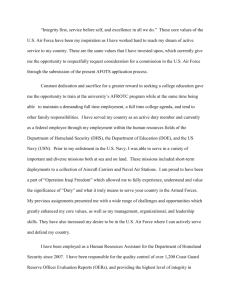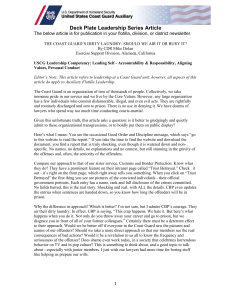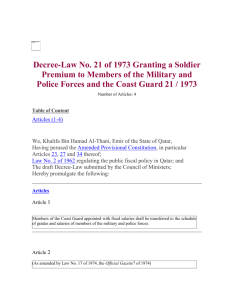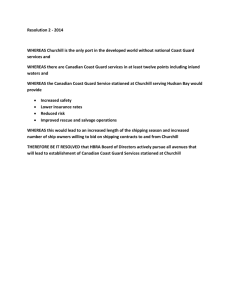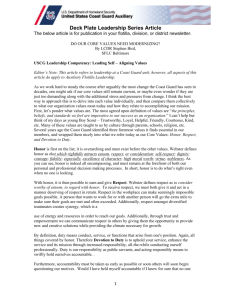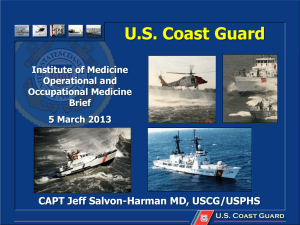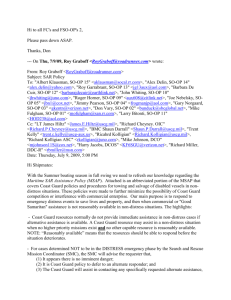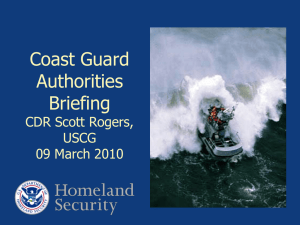Opportunities for Medical Officers in the USCG 2014
advertisement
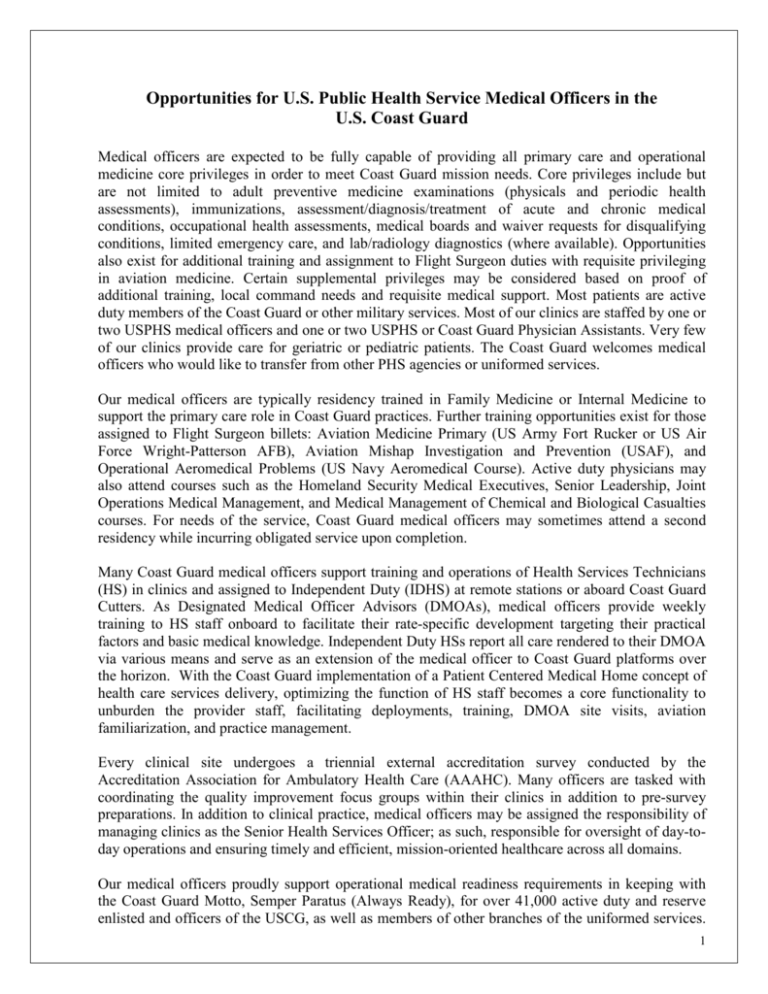
Opportunities for U.S. Public Health Service Medical Officers in the U.S. Coast Guard Medical officers are expected to be fully capable of providing all primary care and operational medicine core privileges in order to meet Coast Guard mission needs. Core privileges include but are not limited to adult preventive medicine examinations (physicals and periodic health assessments), immunizations, assessment/diagnosis/treatment of acute and chronic medical conditions, occupational health assessments, medical boards and waiver requests for disqualifying conditions, limited emergency care, and lab/radiology diagnostics (where available). Opportunities also exist for additional training and assignment to Flight Surgeon duties with requisite privileging in aviation medicine. Certain supplemental privileges may be considered based on proof of additional training, local command needs and requisite medical support. Most patients are active duty members of the Coast Guard or other military services. Most of our clinics are staffed by one or two USPHS medical officers and one or two USPHS or Coast Guard Physician Assistants. Very few of our clinics provide care for geriatric or pediatric patients. The Coast Guard welcomes medical officers who would like to transfer from other PHS agencies or uniformed services. Our medical officers are typically residency trained in Family Medicine or Internal Medicine to support the primary care role in Coast Guard practices. Further training opportunities exist for those assigned to Flight Surgeon billets: Aviation Medicine Primary (US Army Fort Rucker or US Air Force Wright-Patterson AFB), Aviation Mishap Investigation and Prevention (USAF), and Operational Aeromedical Problems (US Navy Aeromedical Course). Active duty physicians may also attend courses such as the Homeland Security Medical Executives, Senior Leadership, Joint Operations Medical Management, and Medical Management of Chemical and Biological Casualties courses. For needs of the service, Coast Guard medical officers may sometimes attend a second residency while incurring obligated service upon completion. Many Coast Guard medical officers support training and operations of Health Services Technicians (HS) in clinics and assigned to Independent Duty (IDHS) at remote stations or aboard Coast Guard Cutters. As Designated Medical Officer Advisors (DMOAs), medical officers provide weekly training to HS staff onboard to facilitate their rate-specific development targeting their practical factors and basic medical knowledge. Independent Duty HSs report all care rendered to their DMOA via various means and serve as an extension of the medical officer to Coast Guard platforms over the horizon. With the Coast Guard implementation of a Patient Centered Medical Home concept of health care services delivery, optimizing the function of HS staff becomes a core functionality to unburden the provider staff, facilitating deployments, training, DMOA site visits, aviation familiarization, and practice management. Every clinical site undergoes a triennial external accreditation survey conducted by the Accreditation Association for Ambulatory Health Care (AAAHC). Many officers are tasked with coordinating the quality improvement focus groups within their clinics in addition to pre-survey preparations. In addition to clinical practice, medical officers may be assigned the responsibility of managing clinics as the Senior Health Services Officer; as such, responsible for oversight of day-today operations and ensuring timely and efficient, mission-oriented healthcare across all domains. Our medical officers proudly support operational medical readiness requirements in keeping with the Coast Guard Motto, Semper Paratus (Always Ready), for over 41,000 active duty and reserve enlisted and officers of the USCG, as well as members of other branches of the uniformed services. 1 On an average Coast Guard day, we save 15 lives, assist 114 people in distress, conduct 82 search and rescues, 23 waterfront facility safety inspections, 202 law enforcement boardings, service 40 aids to navigation, interdict 26 illegal migrants at sea, protects $4.9 million in property, seize $12.4 million worth of illegal drugs, and provides 4 cutters in support of Theatre Security Operations. The missions of the Coast Guard comprise protection of the sea, protection of those who work/live on or near the sea, and Homeland Security from threats delivered by sea. Historically, the Coast Guard functions under the Navy in times of war. Since March 1, 2003, the Coast Guard became a division under the Department of Homeland Security (DHS). Sixty-three physicians serve in clinics located along the Atlantic, Gulf, Pacific, and Great Lakes coasts, including Alaska, Hawaii and Puerto Rico. USCG Medical Officers are expected to move (Permanent Change in Station – PCS) every 3 to 5 years depending on duty station location and needs of the USCG. A typical career officer will likely incur 4 to 6 duty locations in a typical twenty-year career. LOCATION OF COAST GUARD CLINICS Key: TRACEN - Training Center ATC - Aviation Training Center Air Station Port Angeles, WA Air Station Detroit, MI Base Boston, MA Base Seattle, WA Air Station Cape Cod, MA Sector Columbia River, Astoria, OR Air Station Traverse City, MI CG Yard, Baltimore, MD Air Station North Bend,OR Air Station Humboldt Bay TRACEN Petaluma, CA Air Station Sacramento, CA Base Alameda/HSWL SC Oakland, CA Base LA/LB, CA Air Station San Diego, CA U.S.C.G. Headquarters Washington, DC Base Portsmouth/ HSWL SC Norfolk, VA Base New Orleans, LA Air Station Houston/ Sector FO Galveston Air Station Corpus Christi Alaska Hawaii Air Station Sitka ATC Mobile,AL Base/Air Station Elizabeth City, NC Air Station Savannah, GA Air Station Miami, FL Air Station Clearwater, FL Base Miami, FL Sector Key West, FL Base Honolulu/ Air Station Barber’s Pt 17th Coast Guard District, Juneau Base/Air Station Kodiak USCG Academy, New London, CT Sector New York, Staten Island TRACEN Cape May/ Air Station Atlantic City, NJ TRACEN Yorktown, VA Puerto Rico Air Station Borinquen Sector San Juan Base Ketchikan 2 Coast Guard Medical Officer Sites Tour length In yrs. 3 3 4 3 4 5 5 5 5 5 5 5 5 5 5 5 PACIFIC COAST Tour ATLANTIC/GULF COAST length In yrs. Kodiak, AK* 5 Detroit, MI Sitka, AK * 5 Traverse City, MI Juneau, AK* 5 Boston, MA Ketchikan, AK* 5 Cape Cod, MA Honolulu, HI * 5 New London, CT (USCGA) Port Angeles, WA 5 Staten Island, NY Seattle, WA 5 Atlantic City, NJ Astoria, OR 5 Cape May, NJ (Boot Camp) North Bend, OR 5 Baltimore, MD (CG Yard) Humboldt Bay, CA 5 Washington, DC (HQ Clinic/Staff) Petaluma, CA 5 Yorktown, VA Sacramento, CA 5 Portsmouth, VA Oakland, CA (Staff) 5 Norfolk, VA (Staff) Alameda, CA 5 Elizabeth City, NC San Pedro, CA 5 Savannah, GA San Diego, CA 5 Corpus Christi, TX 5 Houston/Galveston, TX 5 New Orleans, LA 5 Mobile, AL 5 Clearwater, FL 5 Opa-Locka, FL (AIRSTA Miami) 5 Miami Beach, FL (Base Miami) 5 Key West, FL San Juan, PR* 3 Borinquen, PR * 3 * OCONUS – Outside Continental U.S. If you are interested in joining our program, you must first be commissioned by the U.S. Public Health Service (USPHS). Information about commissioning and the application process can be obtained by calling the USPHS at (800) 279-1605 or by visiting their web site at: http://www.usphs.gov. To read about the appointment process including the tabulation of your training and education date which will determine what rank at which you will be commissioned, go to: http://dcp.psc.gov/PDF_docs/ccpmtransmittal663_2.pdf 3 Training and Experience Date (T&E): The T&E date calculation varies by profession. In general, 4 years credit is given for baccalaureate level degree, regardless of how long it took to obtain the degree and then additional credit is given for the medical degree. The number of years of T&E credit required for each rank is as follows: Rank Temporary Permanent O-2 Lieutenant Junior Grade 4 years 7 years (LTjg) O-3 Lieutenant (LT) 8 years 10 years O-4* Lieutenant Commander 12 years 17 years (LCDR) O-5* Commander (CDR) 17 years 24 years O-6* Captain (CAPT) 24 years 25 years * These three ranks are restricted grades – new officers cannot be given this rank unless they have enough credit to earn a permanent O-4 (the full 17 years are required). To get an idea of what your starting salary will be, go to Military Pay Rates: http://www.dfas.mil/militarymembers/payentitlements/militarypaytables.html. Your military pay will include the following: • • • Basic Pay: The years of service reflects the years of active duty service in the military/uniformed services) Basic Allowance Housing (BAH): This varies based on the area of your duty station and whether you are single or married and have children. Special Pay for Medical Officers: - Variable Special Pay (VSP): All medical officers receive this. It is based on years in service and rank. - Multiyear Retention Bonus (MRB): Based on length of the contract you sign – 2, 3, 4 year. - Incentive Special Pay (ISP): All medical officers receive this. - Board Certified Pay: Those physicians with board certification receive this. It is based on years of service only. For assistance with your USPHS application please contact CAPT Wade McConnell at 202.4755186 or Wade.B.McConnell@uscg.mil. For additional information on the Coast Guard medical officer program please contact: Jeff Salvon-Harman, MD, FS CAPTAIN, U.S. Public Health Service Operational Medicine Chief (CG-1121) Jeffrey.C.SalvonHarman@uscg.mil Address: COMMANDANT (CG-1121) ATTN OFFICE OF HEALTH SERVICES US COAST GUARD 2703 MARTIN LUTHER KING JR AVE, SE STOP 7907 WASHINGTON DC 20593-7902 4
